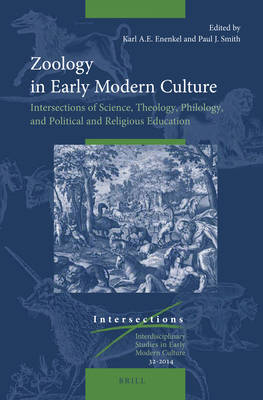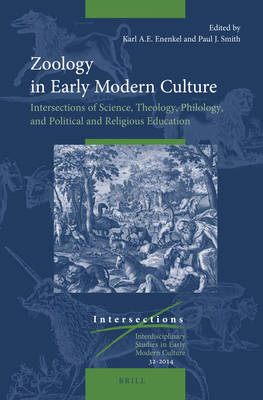
- Afhalen na 1 uur in een winkel met voorraad
- Gratis thuislevering in België vanaf € 30
- Ruim aanbod met 7 miljoen producten
- Afhalen na 1 uur in een winkel met voorraad
- Gratis thuislevering in België vanaf € 30
- Ruim aanbod met 7 miljoen producten
Zoeken
Zoology in Early Modern Culture: Intersections of Science, Theology, Philology, and Political and Religious Education
Enenkel Karl
€ 168,26
+ 336 punten
Omschrijving
This volume tries to map out the intriguing amalgam of the different, partly conflicting approaches that shaped early modern zoology. Early modern reading of the "Book of Nature" comprised, among others, the description of species in the literary tradition of antiquity, as well as empirical observations, vivisection, and modern eyewitness accounts; the "translation" of zoological species into visual art for devotion, prayer, and religious education, but also scientific and scholarly curiosity; theoretical, philosophical, and theological thinking regarding God's creation, the Flood, and the generation of animals; new attempts with respect to nomenclature and taxonomy; the discovery of unknown species in the New World; impressive Wunderkammer collections, and the keeping of exotic animals in princely menageries. The volume demonstrates that theology and philology played a pivotal role in the complex formation of this new science.
Contributors include: Brian Ogilvie, Bernd Roling, Erik Jorink, Paul Smith, Sabine Kalff, Tamás Demeter, Amanda Herrin, Marrigje Rikken, Alexander Loose, Sophia Hendrikx, and Karl Enenkel.
Contributors include: Brian Ogilvie, Bernd Roling, Erik Jorink, Paul Smith, Sabine Kalff, Tamás Demeter, Amanda Herrin, Marrigje Rikken, Alexander Loose, Sophia Hendrikx, and Karl Enenkel.
Specificaties
Betrokkenen
- Auteur(s):
- Uitgeverij:
Inhoud
- Aantal bladzijden:
- 522
- Taal:
- Engels
- Reeks:
- Reeksnummer:
- nr. 32
Eigenschappen
- Productcode (EAN):
- 9789004268234
- Verschijningsdatum:
- 13/10/2014
- Uitvoering:
- Hardcover
- Formaat:
- Genaaid
- Afmetingen:
- 163 mm x 241 mm
- Gewicht:
- 957 g

Alleen bij Standaard Boekhandel
+ 336 punten op je klantenkaart van Standaard Boekhandel
Beoordelingen
We publiceren alleen reviews die voldoen aan de voorwaarden voor reviews. Bekijk onze voorwaarden voor reviews.








